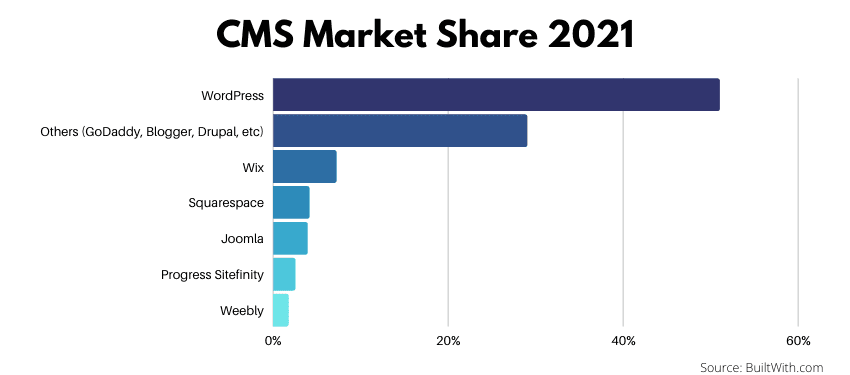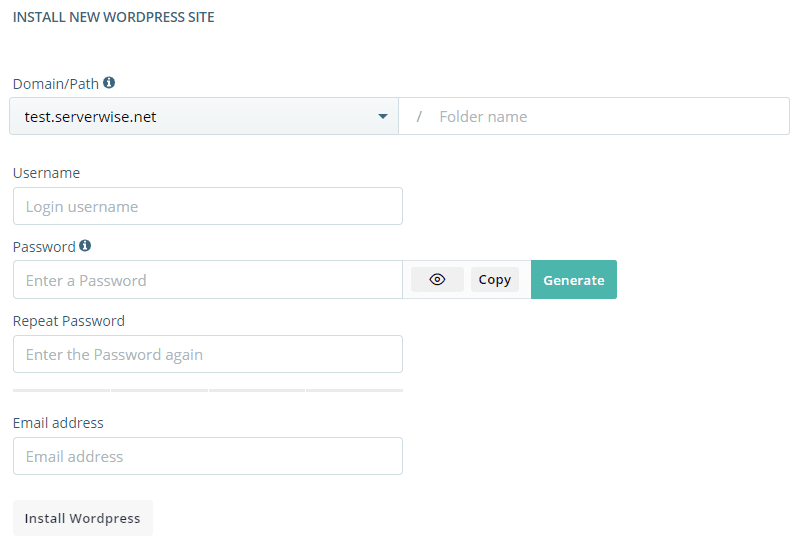Updated: September 14, 2021
Common WordPress Myths That May Be Holding You Back: BUSTED
THE MYTHS ABOUT WORDPRESS
- It’s insecure and unsafe.
- It’s time-consuming to work with and learn.
- It’s really only for bloggers.
- It’s just a starter platform until you’re successful.
- It takes too much technical know-how to install.
WordPress powers nearly 40% of the Internet. Consider that for a minute. That means that over half of all content management systems or blogs are running on WordPress. With 17 posts published on WordPress sites every single second of every day, seven days a week.
And like anything that has reached iconic popularity there is an array of myths and disinformation surrounding the open-source powerhouse.
If you stopped just to find out whether I personally recommend WordPress, yes, I do. But why not read on and let me clear up some of the most common, and uncommon, misconceptions.

Let’s Bust Some Myths!
Myth: WordPress is a high security risk with lots of hacks and holes.
WordPress is written in PHP and frequently makes use of CSS and JavaScript. It’s a more complicated infrastructure than basic HTML websites. Anything that is more complicated has a higher probability of being broken, exploited, and hacked. While it’s true that WordPress is attacked more often than Joomla, that has nothing to do with lazy or improper coding and everything to do with popularity.
WordPress is used on over 50% of content-driven websites, while Joomla is only installed on 3.4%. Hackers won’t waste their time targeting software that is only used on less than 4% when their time is far better spent focusing on the going after the leader in the market.
Same principle in computer operating systems. Windows with 61% of the desktop operating system market is simply more attractive to cybercriminals when compared to Apple’s 29% share.
WordPress is just as safe and secure as anything online, provided, you’re a proactive user who uses best safety and security practices (as you would for anything). You may live in a very safe neighborhood, but you still lock your door at night – your WordPress site is no different.
It’s important to know that the popularity of WordPress is a major contributing factor to how quickly the platform can release major security fixes. With so many websites worldwide now depending on WordPress fixes, glitches and insecurities are discovered and patched rapidly.
Fact: WordPress is just as secure as anything else.
When you first got your driver’s license, you were taught how dangerous driving can be, which is when you were also taught how to be a defensive driver. Pay attention, be aware and take precautions.
If you apply those same lessons to your WordPress site, you’ll have nothing to worry about. Reducing your risk of an attack or hack on your site is easy:
- Don’t use “admin” as your actual administrator username.
- Use long and strong passwords and change it frequently.
- Restrict access to your staff and/or clients based on what they need to do their jobs effectively. A content writer shouldn’t have administrator level access. A customer service staffer shouldn’t have access to your theme or plugins.
- Choose your hosting platform very wisely. Don’t go cheap. You want secure and optimized hosting on a scalable VPS cloud-based infrastructure with built-in speed and security. ServerWise meets and exceeds all recommendations when it comes to a business-class WordPress host.
- Always keep your WordPress install, theme and all plugins up-to-date, preferably testing all updates and patches on an isolated staging environment before taking them live on your site. ServerWise does this for you, including testing and applying all necessary updates.
Myth: WordPress is time-consuming to work with and difficult to learn.
Whenever I hear this assumption, I can accurately jump to a few assumptions of my own, namely that the person is comparing WordPress to Squarespace, Weebly, and Wix.
While they are all popular drag-and-drop website builders, for some reason this myth (happily perpetuated by the competitors listed above) keeps many people from trying WordPress.
Fact: WordPress is just as intuitive as any other, and everything requires some learning.
Sure, at first glance at the features and screenshots, WordPress can seem a tad overwhelming. You’re going to have that with any powerful solution with provides so much versatility.
Every builder on the market has a learning curve, but luckily WordPress has more users and is powering more websites than all the other drag-and-drop solutions put together. This means that the WordPress community is massive and extremely quick to react to issues and extremely helpful to one another.
If you’re new to WordPress and a ServerWise client, you can request our helpful quick video tutorials added to your WordPress Admin. Anything you need to do on WordPress, we have a video for that and in just 60 seconds you’ll see exactly what to do.
While there are countless helpful and well-done WordPress tutorials on YouTube (more than any other website builder) our ServerWise videos are quick, effective and highly focused to save you time.

Myth: WordPress is really for bloggers and content producers.
WordPress was originally developed as a content management system for blogging and content posting and sharing, but the open-source platform has evolved over the last many years.
Fact: Themes and plugins can turn WordPress into anything you need it to become.
These days, WordPress powers everything:
- E-commerce sites with thousands of products
- Membership sites
- Coaching and personal services
- Video sharing
- Intranet
- Directory and classifieds
- Sales pages with funnel software integration
One of the greatest advantages of WordPress is its ability to extend features and functionality as needed.
Plus, you’re still getting the world’s most powerful and robust content management system for your content marketing needs.
Of course, if you don’t need to use the CMS functions, don’t use them.
Myth: WordPress is only used as a starter platform, but once successful, businesses move to something else.
WordPress is free which makes giving it a try easy and low risk, but it’s also scalable and, in fact, is currently running some of the largest and most profitable sites in the world.
Fact: Don’t take my word for it, check out some current brands running on WordPress.
- Verizon FIOS
- TED (as in Ted Talks)
- Etsy
- The White House
- Reuters
- PlayStation
- Zillow
- Skype
- Yelp
- The New Yorker
- Glassdoor
- Microsoft
Surely any of those companies listed can afford to move to a pricey propriety solution, but they want something powerful, rich in features and highly scalable. And they want something that is consistently updated while they remain in complete control.
After all, the largest advantage of WordPress is its open-source nature. You don’t have to worry about a company buying it and increasing the price two-fold, or the owner declaring bankruptcy and shutting down with little notice.
WordPress is owned by the world, and that means no one can take it away from you or surprise you with a large invoice. You have absolute control over your own WordPress install.
Myth: Installing WordPress takes technical knowledge and skills.
It’s largely assumed that signing up for a proprietary drag-and-drop builder such as Squarespace or Wix is your only option if you have little to no coding knowledge and don’t want to worry about trying to install WordPress. Not so.
Fact: WordPress installs in a click with no technical knowledge or experience needed.
Most web hosts that support WordPress (everyone does) offer a one-click installer. Log into your hosting control panel and click Install (or something similar) and it’s done and activated for you. Couldn’t be easier.
ServerWise clients who use only WordPress (not Joomla or Magento, for example) on their websites receives our optimized proprietary control panel with a built-in WordPress Manager and easy single-click install.

We’ve busted the most commonly held WordPress myths, but if you are still unsure, may I humbly suggest signing up for a ServerWise account. You can use our integrated how-to videos that will appear throughout your WordPress Admin Control Panel to learn. And if you get stuck or need some guidance, you’ll have stellar ServerWise experts to guide you.



Divi and Elementor are popular WordPress visual page builder plugins for a reason, but which is best for your needs? Let’s examine the similarities, differences, strengths, weaknesses and pricing to answer that question. Keep Learning >

We tested Smush Pro CDN, WPMU DEV and Bunny.net and switched to Bunny CDN with no regrets. Faster, flexible, no WordPress plugin required and cheaper. Let me explain. Keep Learning >



